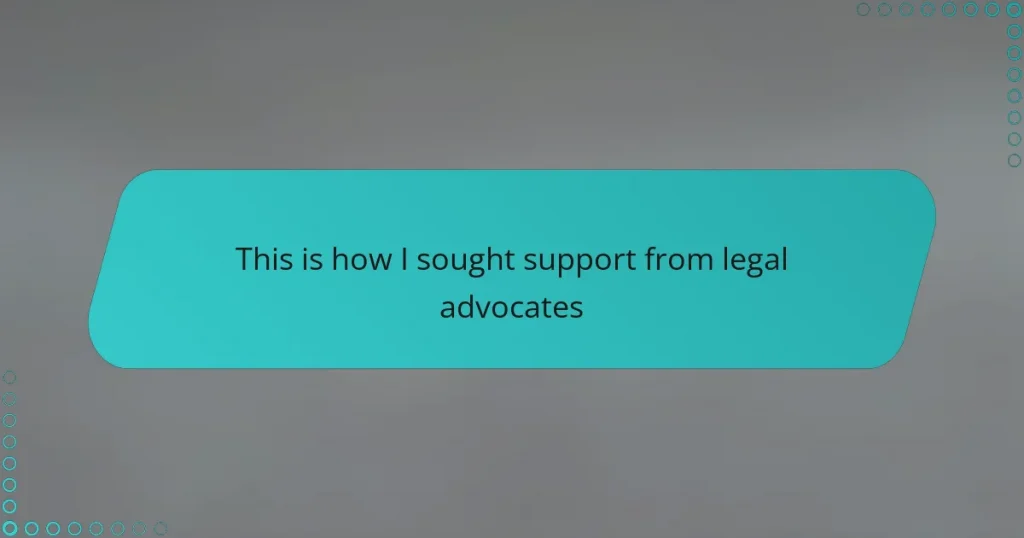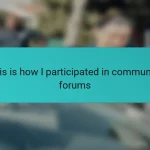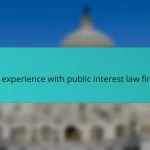Key takeaways
- Legal advocacy is about building trust and understanding, providing emotional support while navigating complex legal systems.
- Various forms of legal support exist, including mediation, negotiation, and community organizations offering free or low-cost services.
- Preparing for consultations by gathering relevant documents and articulating questions can significantly enhance the effectiveness of your time with an advocate.
- Clear communication and regular check-ins with legal advocates foster a strong partnership and help manage anxiety throughout the legal process.
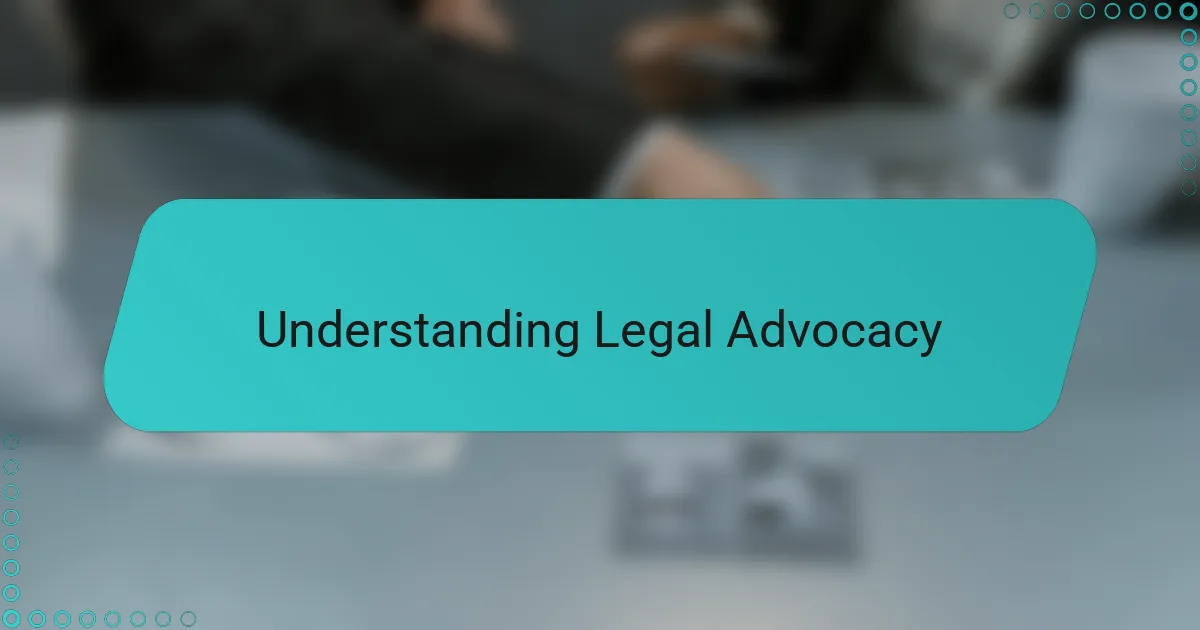
Understanding Legal Advocacy
Legal advocacy, from my experience, is more than just knowing the law—it’s about amplifying the voices of those who might otherwise be unheard. Have you ever felt overwhelmed by paperwork or legal jargon? That’s exactly where advocates step in, guiding you through complexities with empathy and expertise.
When I first sought support, I realized legal advocacy is a bridge between confusion and clarity. It’s a partnership rooted in trust, where advocates don’t just tell you what to do but listen and stand by your side. This personal connection made me feel empowered, not lost in a system.
What struck me most is how legal advocates navigate not only rules but emotions. They understand that behind every case is a human story—something that statistics or laws can’t capture. This emotional insight turned my legal journey from intimidating to hopeful.
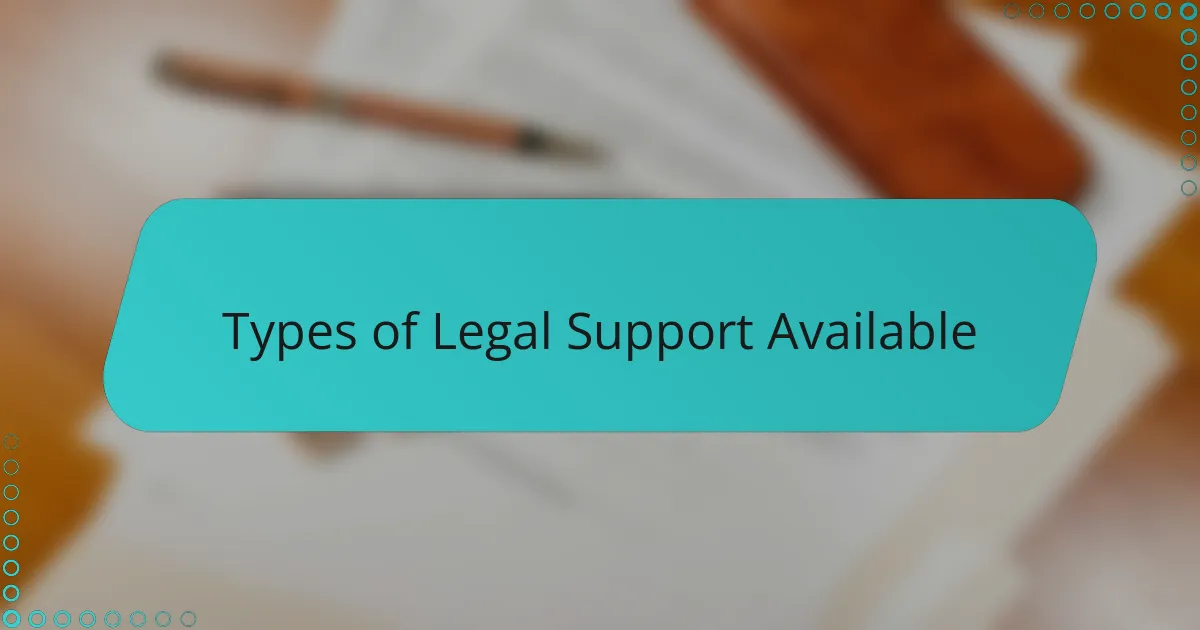
Types of Legal Support Available
Legal support comes in many forms, and knowing which type fits your situation can make all the difference. For example, sometimes I found that having a lawyer represent me in court was essential, especially when the stakes were high and the legal language felt like a foreign code. Other times, a legal advisor helped me understand my rights and options without the pressure of formal proceedings.
I also discovered that not all support revolves around courtroom battles. There are advocates who specialize in mediation or negotiation, helping to resolve conflicts before they escalate. Have you ever wished someone could just explain complicated documents or processes in plain language? Those advocates became my lifeline, translating legalese into clear, manageable steps.
What I appreciated most was the availability of free or low-cost legal clinics and community organizations offering support tailored to different needs. They felt like a safe space where I could ask questions without judgment. This variety of legal support options meant I wasn’t alone, no matter how complex or personal my issue was.
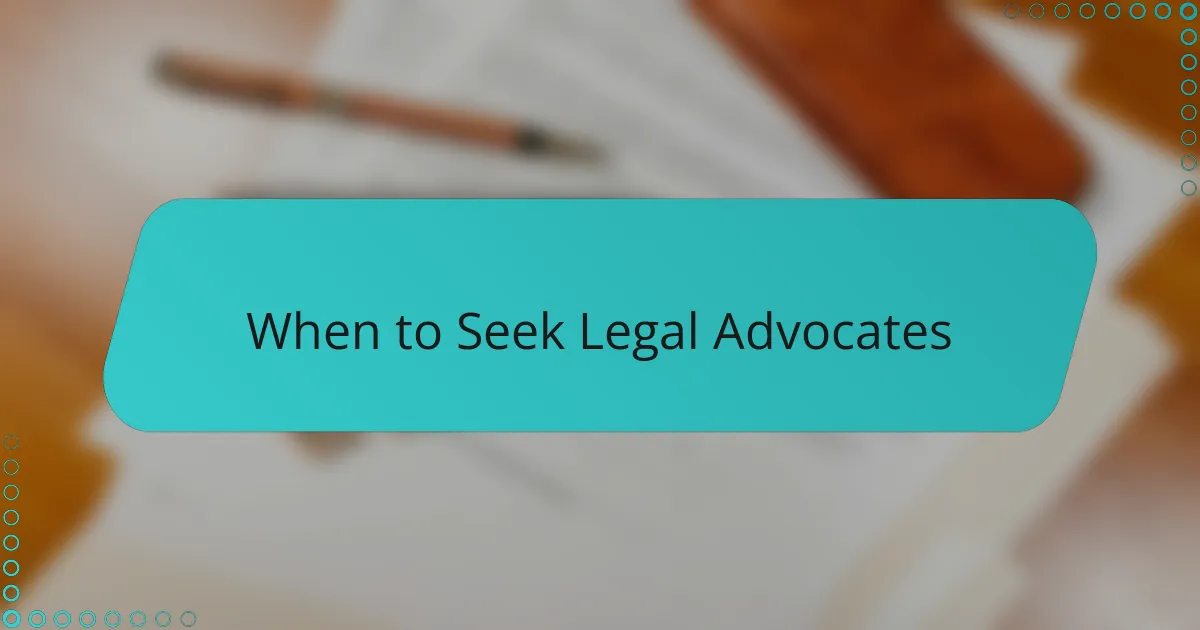
When to Seek Legal Advocates
Knowing when to seek legal advocates can be tricky. I learned to reach out when the situation felt too complex for me to handle alone—like facing unfamiliar laws or overwhelming paperwork. Have you ever been stuck, unsure where to turn next? That was my signal to find someone who truly understands the system.
There was a moment when I realized the stakes were higher than I initially thought. I remember feeling anxious and isolated, wondering if I could navigate the process without help. That’s when I reached out to a legal advocate, and it changed everything. Their guidance didn’t just clarify the next steps; it gave me a sense of control and hope.
Sometimes, the need for legal advocates isn’t just about big, dramatic cases. It can be the subtle moments—when your rights feel unclear or a decision weighs heavily on your mind. I discovered that seeking support early, even for small doubts, spared me from unnecessary stress and confusion down the line. Have you considered getting help before things spiral? I can honestly say it made my journey less daunting.
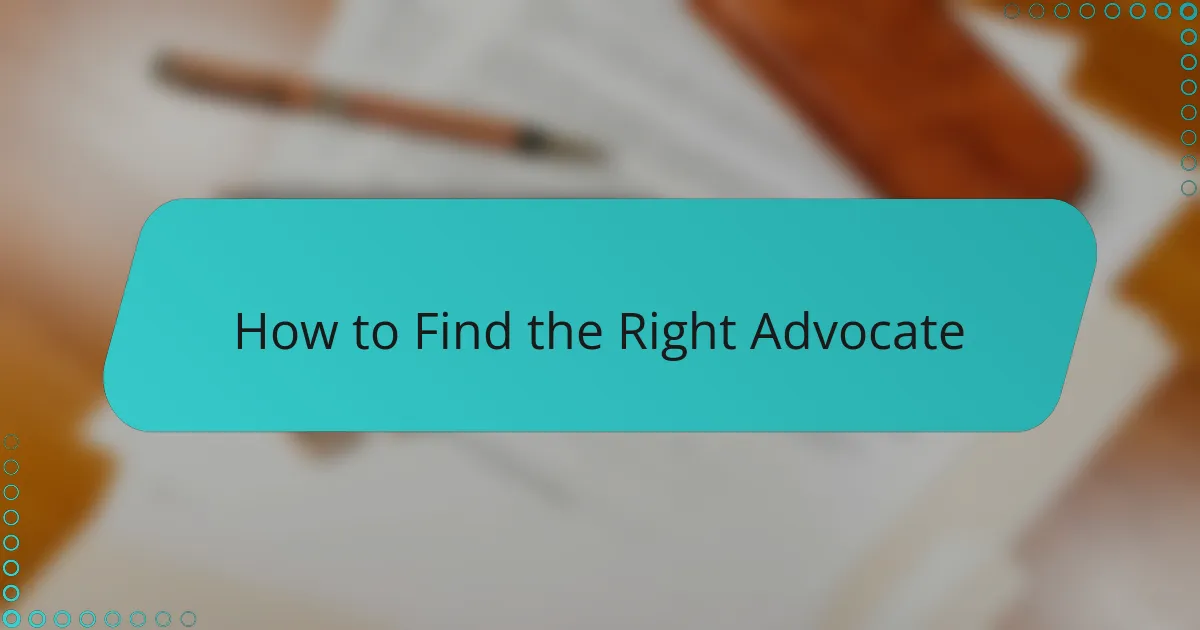
How to Find the Right Advocate
Finding the right advocate felt like a daunting maze at first. I asked myself, “Who can truly understand my situation and fight for me?” What helped me was looking for someone with experience in the exact area my case involved—specialization matters more than I expected.
I also realized trust isn’t automatic; it’s built through conversation. When I spoke with potential advocates, I paid attention to how they listened and responded. Did they make me feel heard, or just rushed through my story? That emotional connection was the turning point for me.
Lastly, I found that recommendations from friends or local legal groups were priceless. Have you ever noticed how a personal referral often leads to the best support? I learned that genuine advocates usually come through word-of-mouth because they leave a real impact on those they help.
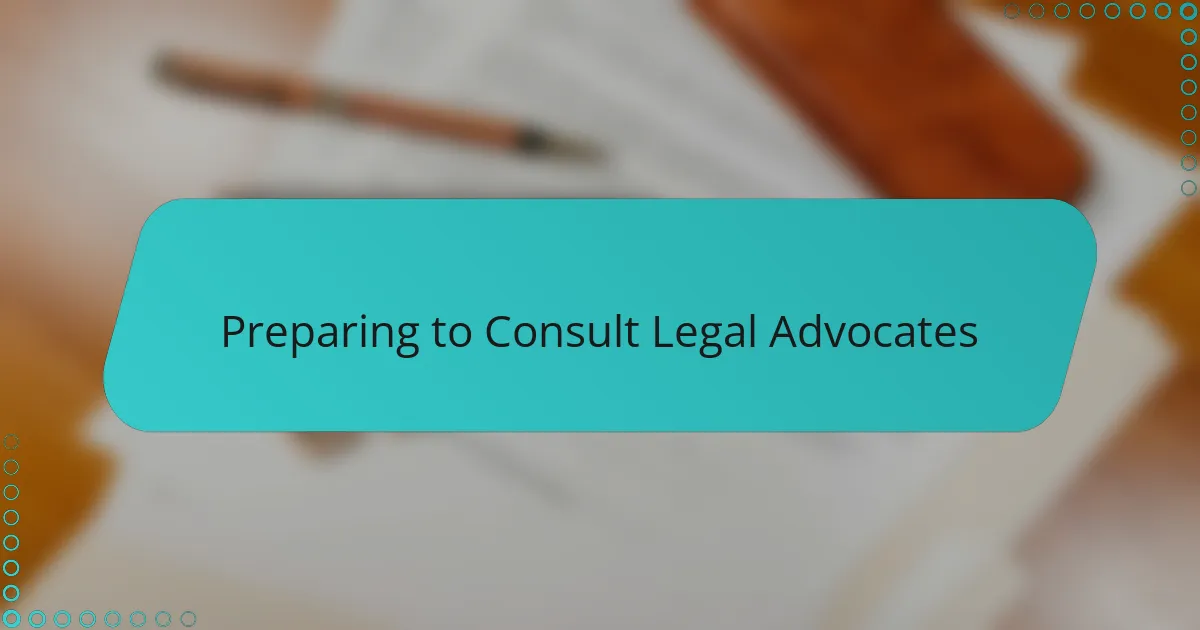
Preparing to Consult Legal Advocates
Before I even picked up the phone to consult a legal advocate, I made sure to gather every relevant document and detail about my situation. Have you ever shown up to an important meeting unprepared? I learned the hard way that having a clear timeline and key facts made all the difference in how smoothly my consultation went.
I also took time to jot down the questions and concerns swirling in my mind. It felt silly at first, but writing things down helped me organize my thoughts and focus on what truly mattered. When I finally spoke with my advocate, I wasn’t scrambling for answers—I was ready to listen and engage meaningfully.
Another thing I discovered was the value of honesty about my expectations and limits. I asked myself, “What outcome do I realistically hope for?” Sharing this openly during my consultation built trust and aligned our efforts. That openness turned what could have been an awkward exchange into a productive, reassuring conversation.
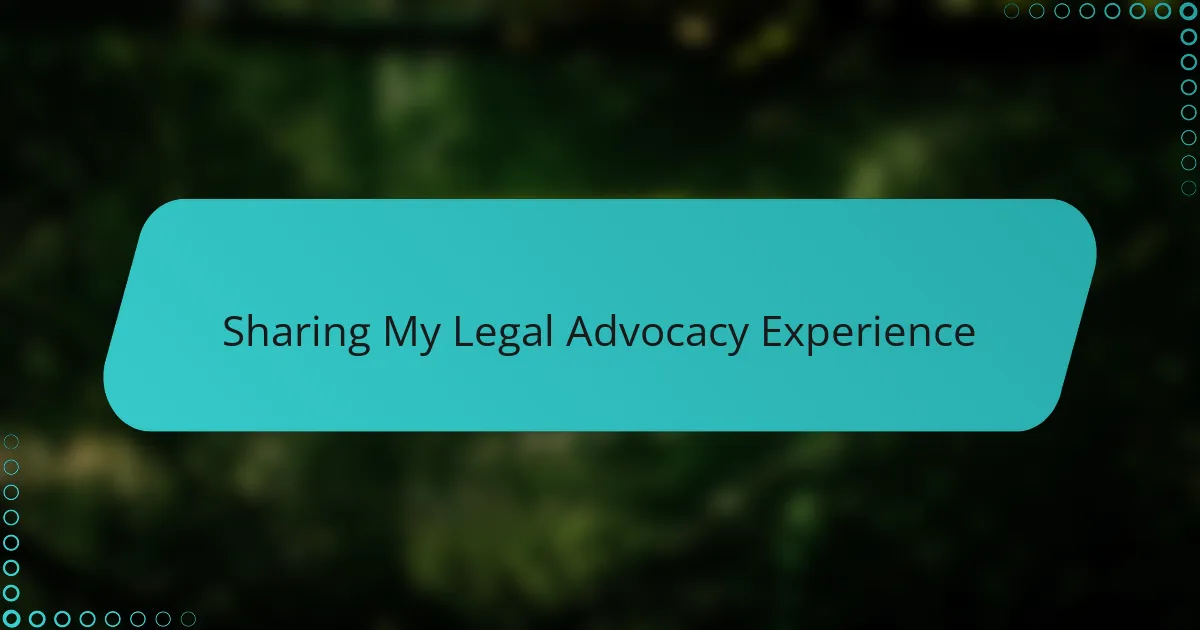
Sharing My Legal Advocacy Experience
When I first decided to share my legal advocacy experience, I wasn’t sure if my story was worth telling. But then I realized that talking about the challenges and moments of clarity I encountered could truly help others feel less alone. Have you ever hesitated to open up about something complicated? I found that being honest about my fears and the support I received created a genuine connection with people who could relate.
Looking back, I remember how powerful it was to describe the way my advocate didn’t just handle the legal side but also acknowledged my anxiety and doubts. That personal touch is something I emphasize whenever I share my experience because it made all the difference. Don’t you think legal help feels more effective when it respects the person behind the case? For me, this emotional insight transformed a daunting journey into a shared one.
Sometimes, sharing my story feels like passing along a lifeline. I try to highlight not only the victories but also the moments when I stumbled or felt overwhelmed—that honesty encourages others to seek help without shame. Have you ever felt hesitant to ask for support because you thought you should handle things alone? Opening up changed how I viewed legal advocacy, turning it into a partnership I value deeply.
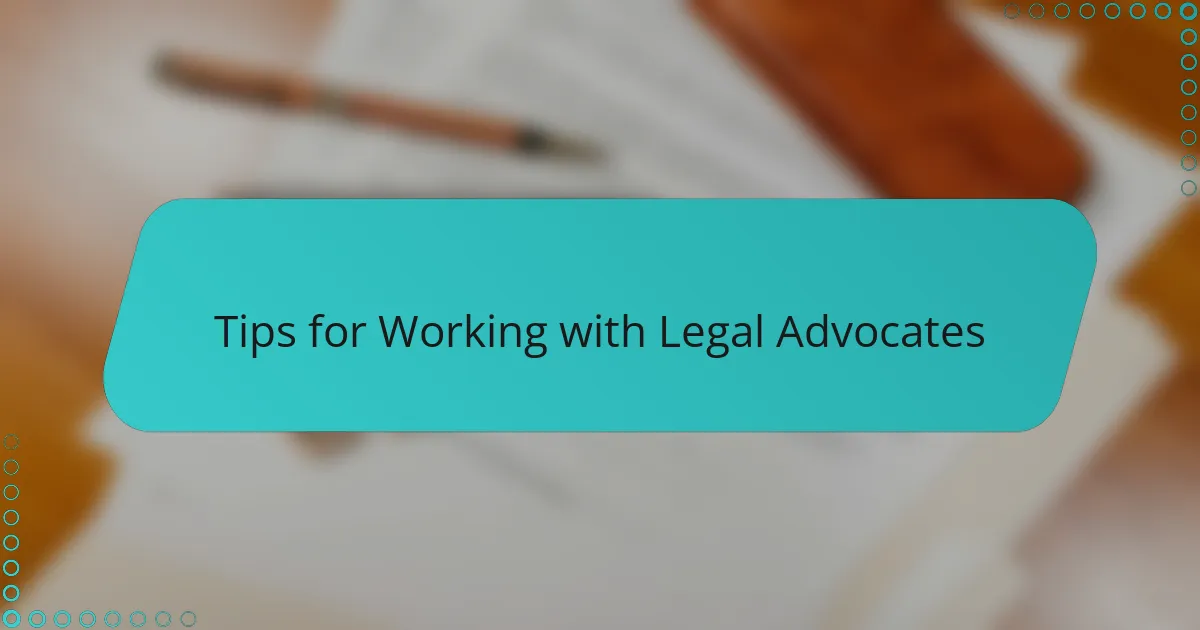
Tips for Working with Legal Advocates
One thing I quickly learned when working with legal advocates is the importance of clear communication. Have you ever felt like you’re talking in circles, unsure if your advocate really understands your concerns? I found that being upfront about what I needed—and asking for clarification when legal terms flew over my head—made our collaboration far more effective.
Scheduling regular check-ins helped me stay connected and feel supported throughout the process. It’s easy to feel left out when updates are sparse, so I made it a point to ask for progress reports, even if it was just a quick call or email. Trust me, those small moments kept my anxiety in check and the partnership strong.
Lastly, I can’t stress enough how crucial it is to be patient with yourself and your advocate. Legal matters often take time, and I remember feeling frustrated when answers didn’t come quickly. But reminding myself that my advocate was navigating complex systems on my behalf helped me stay grounded—and that patience truly paid off in the end.
